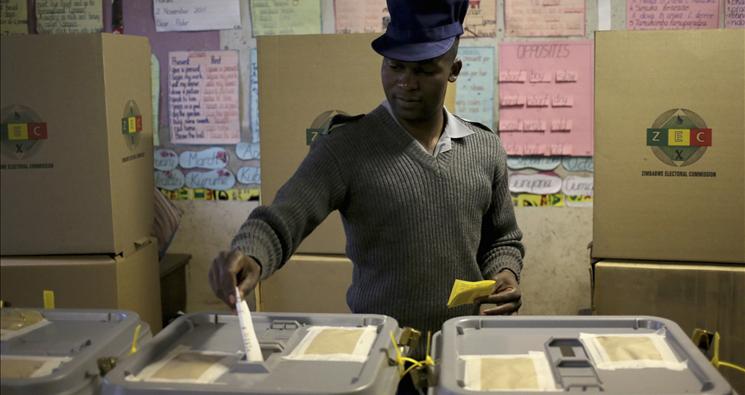A Reflection on Zimbabwe’s 2013 Elections
After tallying the votes cast on July 31, 2013, the independent and multi-party Zimbabwe Election Commission (ZEC) declared President Robert Mugabe as the outright winner of the 2013 presidential election in Zimbabwe. President Mugabe polled 61.09 percent (2,110,434 votes out of the possible 3,315,000 participating voters). In the announced results, his main rival, outgoing Prime Minister Mr. Morgan Tsvangirai of the Movement for Democratic Change (MDC-T) party, polled 33.94 percent (1,172,349 votes) and the smaller MDC leader, Professor Welshman Ncube, accounted for only 2.68 percent of votes cast. The Zimbabwe African People’s Union (ZAPU) leader Mr. Dumiso Dabengwa and the Zimbabwe Development Party president, Mr. Kisinoti Mukwazhe, obtained 0.74 percent and 0.29 percent respectively.
President Mugabe’s party, the Zimbabwe African National Union (ZANU-PF) party also gained enough seats to surpass a two-thirds parliamentary majority, now holding 160 elected seats out of 210. MDC-T secured 49, and one seat went to an expelled ZANU-PF independent. By attaining more than 76 percent of the National Assembly (lower house) seats, ZANU-PF has secured the two-thirds majority necessary to make laws and amend the constitution.
The combined election sought to end the power-sharing government, formed in February 2008 by ZANU-PF, MDC-T, and the smaller MDC at the behest of regional leaders following a disputed 2008 election marred by violence. The 2013 election was held in order to select a President, lower-house members of parliament, and local authority councilors, leading to a proportional allocation of senators and provincial councils, as called for by the new constitution and electoral law confirmed during the March referendum. Both the elections and the referendum were supervised by ZEC, whose members were appointed unanimously and jointly by the three parties.
Observers came from the African Union, the Southern Africa Development Community (SADC), the SADC Electoral Supervisory Commissions (SADC-ESC) peer review forum, the SADC Parliamentary Forum, individual countries inside and outside of Africa, over 5,000 others from Zimbabwe's civil society groups/NGOs, and the Protestant, Catholic, Evangelical & Indigenous churches in Zimbabwe & the Southern Africa region. All observers (in pre- and post-election statements) concluded that both the election campaign and actual vote were peaceful. The SADC observer mission deployed 170 teams of observers with 573 observers throughout the ten (10) Provinces of Zimbabwe. The teams were comprised of SADC members of Parliament, Civil Servants, and Civil Society Organizations, and the project was chaired by Bernard Membe, Tanzania’s Foreign Affairs minister. This was the largest observer mission ever deployed by SADC. President Mugabe declined to invite Western observers, citing the sanctions as proof of their bias against him and his party. Western embassies’ staff were, however, allowed to freely view the polling taking place in the vicinity of Harare.
In Zimbabwe, ZANU-PF and MDC-T have habitually traded accusations of unfair electoral environments, with ZANU-PF citing the unfairness of holding elections while voters are intimidated by western sanctions, the unfairness of pro-opposition pirate radio stations and the disadvantages of having candidates and a party under sanctions blackmail. On the other hand, MDC-T cites unfairness of pro-ZANU-PF state media, security forces and traditional leaders. It seems that a power-sharing government, a jointly appointed ZEC, the presence of commonly accepted observers, and a jointly crafted constitution have become the guarantors of a fair electoral environment.
In 2013, western governments benchmarked the removal of sanctions on Zimbabwe based on the credibility of its 2013 elections, as determined by the African Union and SADC. Sanctions imposed by western countries have been very controversial in Zimbabwe, since they have never been mandated or upheld by the United Nations.
The African Union, SADC, and South African President Jacob Zuma (the SADC facilitator on the Zimbabwe dialogue) all applauded the peaceful poll and congratulated President Mugabe for his victory. Countries that followed suit include Tanzania, Zambia, Kenya, Namibia, Mauritius, Nigeria, Russia, China, the Caribbean & Pacific Association, Saharawi, and Venezuela. The African Union and others noted some technical flaws in the electoral logistics and voters roll, but said these would not affect the overall results and that the elections positively reflect the general will of Zimbabweans.
Results Disputes
After the results became known to contestants and before they were announced to the public, the MDC-T leader, his party, and the Zimbabwe Election Support Network (SESN) comprised of local NGOs issued statements rejecting the ZANU-PF win. They said the country cannot be kept in an election mode forever. But one MDC-T ally, the National Constitutional Assembly (NCA), broke ranks with SESN and reprimanded the MDC-T for reneging on earlier pledges to accept the results based on the prevailing conditions as they transpired.
The disputing teams mainly cite alleged manipulation of the voter’s roll and biased pre-election voter-registration targeting urban areas as perceived MDC-T strongholds. According to those who dispute the fairness of the election, the ZEC and the Registrar General of Voters are to blame. MDC-T contends that election-rigging was facilitated by an Israeli company - Nikuv International Projects - from Tel Aviv. Both ZEC, Registrar General, and Nikuv, who consulted on voter registration systems, have denied any wrongdoing. The AU, SADC, and SADC-ESC commented that all elections world over have technical hitches, but endorsements must be based on the overall assessment of people’s will and that is what they have done. The government of Botswana has called for an independent audit of the elections. Other nations disputing the fairness of the election process include the USA, UK, EU, and Australia.
MDC-T party filed the appropriate petitions to the Constitutional Court of Zimbabwe , and President Mugabe’s swearing in as President of Zimbabwe was delayed. This morning, however, the Court ruled that the 2013 Election was fair. President Mugabe will be sworn in for another five-year term this coming Thursday.
Written by Alex Chisango
Chairperson, African Centre for Law & Justice
